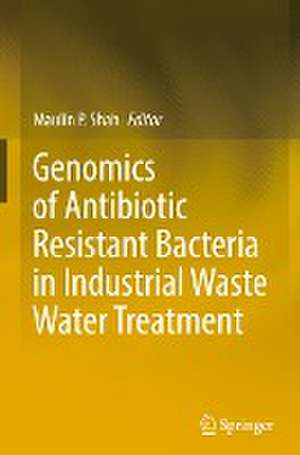Genomics of Antibiotic Resistant Bacteria in Industrial Waste Water Treatment
Editat de Maulin P. Shahen Limba Engleză Hardback – 29 noi 2023
This book discusses the key problems and solutions with various applicable approaches to combat antibiotic-resistant genes in industrial waste water. Several genes are selected within the chapters to illustrate the past and future roles of molecular ecophysiology and genomics in the development of wastewater microbiology as an important subdiscipline of microbial ecology. As we have very limited knowledge of composition, dynamics and stability of microbial communities, various processes in wastewater treatment have been generally considered to be "black box." In recent years, with the development of several new high throughput sequencing platforms, metagenome sequencing strategies and bioinformatics toolboxes, the analysis of the genome of complex communities has become much more accessible and means easier.
The opening of the biological wastewater treatment “black box” is not the unpleasant experience it was before. The viable, but not cultural, ceases tobe the inconsequential, uncharacterizable enigma that existed today. Metagenomics leads the way for more specific studies in related fields. Finally, genomic studies of wastewater treatment microbes, in addition to their biotechnological applications, are also an excellent testing ground for variety of other ecological and environmental burns questions. Wastewater treatment plants are considered hotspots for the environmental dissemination of antimicrobial-resistant determinants. Comparative genomics of antibiotic resistant genes isolated from conventional activated sludge and biological aerated filter wastewater treatment plants is discussed.
Preț: 690.27 lei
Preț vechi: 862.84 lei
-20% Nou
Puncte Express: 1035
Preț estimativ în valută:
132.12€ • 143.57$ • 111.06£
132.12€ • 143.57$ • 111.06£
Carte disponibilă
Livrare economică 31 martie-14 aprilie
Livrare express 15-21 martie pentru 28.70 lei
Preluare comenzi: 021 569.72.76
Specificații
ISBN-13: 9783031446177
ISBN-10: 3031446178
Pagini: 158
Ilustrații: VII, 158 p. 17 illus., 12 illus. in color.
Dimensiuni: 155 x 235 x 17 mm
Greutate: 0.41 kg
Ediția:1st ed. 2023
Editura: Springer International Publishing
Colecția Springer
Locul publicării:Cham, Switzerland
ISBN-10: 3031446178
Pagini: 158
Ilustrații: VII, 158 p. 17 illus., 12 illus. in color.
Dimensiuni: 155 x 235 x 17 mm
Greutate: 0.41 kg
Ediția:1st ed. 2023
Editura: Springer International Publishing
Colecția Springer
Locul publicării:Cham, Switzerland
Cuprins
Characterization methods for microbial communities present in contaminated soils.- Antibiotic Resistance Genes as contaminants in Industrial Waste Water Treatment.- Bacteriophages: A strategy to combat antibiotic resistance in waste water treatment plants.- The emergence of Waste Water Treatment Plant as a leading source for dissemination of Antibiotic-Resistant Gene.- Increasing Prevalence of Antibiotic-resistant genes in industrial wastewater: impact on public health.- Antibiotic resistance genes as emerging contaminants in industrial waste water treatment.- Characterization and Dynamic Shift of Microbial Communities in wastewater treatment plant.
Notă biografică
Dr. Maulin Shah received his Ph.D. (2002–2005) in Environmental Microbiology from Sardar Patel University, Vallabh Vidyanagar, Gujarat. He has served as Assistant Professor at Godhra, Gujarat University, in 2001. He has edited 25 books in the area of wastewater microbiology.
Textul de pe ultima copertă
This book discusses the key problems and solutions with various applicable approaches to combat antibiotic-resistant genes in industrial waste water. Several genes are selected within the chapters to illustrate the past and future roles of molecular ecophysiology and genomics in the development of wastewater microbiology as an important subdiscipline of microbial ecology. As we have very limited knowledge of composition, dynamics and stability of microbial communities, various processes in wastewater treatment have been generally considered to be "black box." In recent years, with the development of several new high throughput sequencing platforms, metagenome sequencing strategies and bioinformatics toolboxes, the analysis of the genome of complex communities has become much more accessible and means easier.
The opening of the biological wastewater treatment “black box” is not the unpleasant experience it was before. The viable, but not cultural, ceases to be the inconsequential, uncharacterizable enigma that existed today. Metagenomics leads the way for more specific studies in related fields. Finally, genomic studies of wastewater treatment microbes, in addition to their biotechnological applications, are also an excellent testing ground for variety of other ecological and environmental burns questions. Wastewater treatment plants are considered hotspots for the environmental dissemination of antimicrobial-resistant determinants. Comparative genomics of antibiotic resistant genes isolated from conventional activated sludge and biological aerated filter wastewater treatment plants is discussed.
Caracteristici
Highlights the importance of molecular techniques to identify antibiotic-resistant bacteria in wastewater treatment Emphasizes the importance of various genomic technologies to clean up toxic pollutants through an innovative approach Introduces new emerging technologies, trends, and advances in environmental genomics
